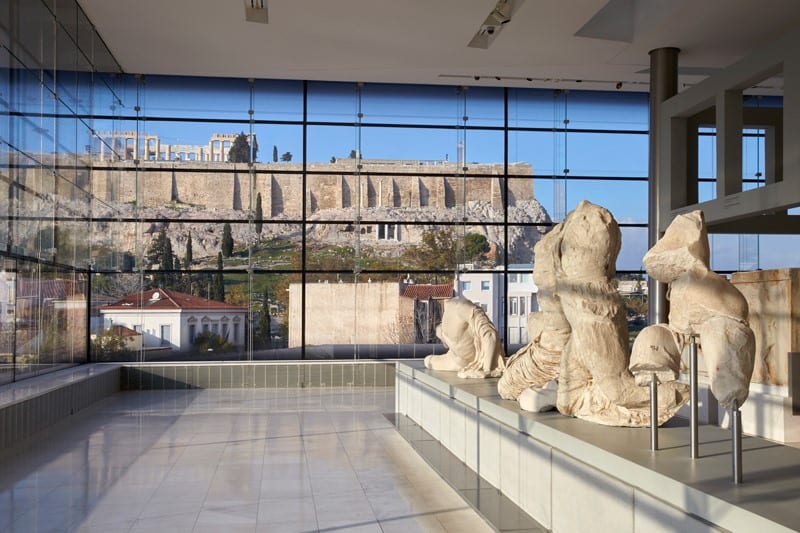A wide variety of arguments have been used by the UK Government and the British Museum to defend against the notion that the Parthenon Sculptures are stolen goods. But according to those fighting for their return, all of those arguments are simply attempts to ‘muddy the waters'.
Speaking to the Ouzo Talk podcast, Founder and Chair of the International Committee – Australia – for the Restitution of the Parthenon Marbles Inc (IOCARPM), Emmanuel John Comino AM, and committee member Theodora Gianniotis, is of the strong opinion that the British Museum is now clutching at straws, as their outdated arguments have been systematically disproven over time.
Most notably, suggestions that Greece did not have anywhere to put the Marble or know how to care for them were responded to a decade ago in defiant fashion with the opening of the Acropolis Museum.
div id='buzzsprout-large-player-artist-the-ouzo-talk-podcast'>
But according to lawyer and cultural heritage specialist Gianniotis, Greece’s abilities in archaeology and conservation have now significantly surpassed those of Britain.
“We’re getting to the point now where we’re telling the British how to look after our cultural heritage if these Marbles aren’t returned, which is a ridiculous situation,” says Gianniotis.
“If anyone’s visited Greece, they definitely know there’s a museum on every corner. I went to Greece in 2005 and saw the incredible restoration work happening through YSMA on the Parthenon. We’re talking about absolute prototype work from curatorial, scientific, and structural engineering – work that’s never ever been done in conservation for a World Heritage site. This is ground-breaking work.
“There will never be a completeness of the study and the understanding of the Parthenon without these sculptures being returned – because of this ground-breaking work.
“The science given to the world from the construction of the Parthenon is now given to the world through the preservation and the conservation of the Parthenon, and that is the symbolism of what the Parthenon is meant to do – educate, inspire.”
But the British Museum and Government are also employing the machinations of bureaucracy and jurisdiction to further muddy the waters, according to Mr Comino – something which was made apparent as recently as last week (Nov 17), when Greek Prime Minister Kyriakos Mitsotakis met with his British counterpart, Boris Johnson, to raise the issue of the Marbles.
“The possession of the Marbles is a matter purely for the Museum – it’s not one for the UK government,” said a spokesman for Prime Minister Johnson.
“The British Museum operates independently of the government. It is free, rightly, from political interference. Any question about the location for the Parthenon sculptures is a matter for them.”
But that statement contradicts the message Mr Comino has received from the British Museum in the past.
“I wrote to the Director of the British Museum, and his reply was that; for the British Museum to send the Marbles back, it needs an Act of Parliament.
“What does that tell you? They’re tossing the ball backwards and forwards.”
In a statement provided to Ouzo Talk following the recording, IOCARPM added that:
“These contradictory statements have been something that IOCARPM has tirelessly pointed out in letter after letter to successive British PMs and the British Museum.
“The recent UNESCO statement has now clearly recognised that this is a governmental issue to be resolved diplomatically in a government forum. The British government can and should make a diplomatic decision on this issue now,” added IOCARPM following the recording of the podcast.
For his part, Mr Comino has a very clear message for the British Museum, its Trustees, and the British Government.
“I say to the British Museum, thank you for looking after them to the best of your knowledge and ability. Let’s forget about whether they took them legally or illegally, let’s forget about the irreparable damage caused in the British Museum – now please do the right thing and undo one of the great wrongs and make it right.”
Doing what’s ‘right’ when it comes to museums – many of whom have stolen goods – has become a movement as institutions the world over come to terms with their colonial/imperial pasts.
Gianniotis argues that the British Museum’s position is anachronistic and that the Museum can change.
“There’s no doubt that history is ugly. Things have happened that shouldn’t have happened, but here’s an opportunity to step up and say, ‘this is another chapter in the Parthenon Marbles’ history, and it’s time to make that right,’” says Gianniotis.
“Museums have changed – they’re changing. Many museums are really stepping up – if they want to keep their doors open, and if they want to stay relevant.
“Museums tell stories. Museum’s once were curiosity boxes, unattached, no stories behind them. Now we’re seeing these great, amazing museums that are telling stories – digital stories – and that’s what you’re seeing when you go into the new Acropolis Museum.
“You’re seeing this continuation of a story, and that’s where they belong, to tell that continuation of that story – not a curiosity box, not pieces of art. These (the Parthenon Marbles) belong to a sacred site in Greece that is still in our living memory as living Hellenes.
“They were illegally taken (from) a country under occupation. The argument is as simple as that. It’s up to the British Museum if they want to be heroes.”
The Ouzo Talk podcast is presented bi-monthly by Greek City Times and is available on all major podcast streaming apps, including Apple Podcasts, Spotify, Google Podcasts and more. Subscribe so you never miss an episode.

Read also: Greece's Minoans were indigenous Europeans, DNA finds


